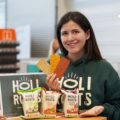Paola's fast lane from business idea to co-founder and manager of a pioneering food start-up, with products on supermarket shelves.
Paola Varela, from Mexico, tells us about the impact of the Food Solutions Programme on her journey as an entrepreneur, operating at the intersection of social entrepreneurship and bioeconomy.


Paola, what is your academic background and what motivated you to apply for the Food Solutions Programme?
Paola Varela: ‘I obtained a bachelor’s degree international business management in Mexico, my country of origin.
After that, I went to the University of Hohenheim, in Germany, for my Master in bioeconomy, with a focus on sustainable bioenergy, food systems and social entrepreneurship.
That made me aware of the challenges with food waste in the food system. I realised the Food Solutions programme was my chance to create my own business and have a meaningful impact.’
What was your Food Solutions challenge about?
‘I participated in the ‘From leaf to root’ project in 2020.
The idea was to develop a prototype of a ready-to-eat product based on plant parts that are not or rarely utilised, thereby promoting a more sustainable use of resources as well as healthier nutrition.
Starting from there, we had to create a business plan while co-operating in teams with people with different expertise, such as biologists and nutritionists.’
What happened after the programme, did you set up your own company?
‘Yes, I did – together with Duyen Do, my Vietnamese co-founder whom I met during the Food Solutions challenge.
She has a background in food science. I always intended to build our concept into a business.
When my team won the second place in the programme, one member of the jury was interested and became our first investor.
In 2021, while we were still studying, we started developing our start-up. The company Holiroots was established in Germany in 2022.’

And it was clearly a success, as we spotted your products in the supermarket!
‘That’s right! We first needed quite some time to develop our business plan, the brand, our value proposition, and of course the products.
We made our first crackers in the kitchen of the university. By the end of that year we got our first orders from two big customers and since 2023 we deliver to the Belgian retailers Bio-Planet and Okay.
In the meantime, we have developed three products: beetroot, carrot, and leek crackers. In summer 2024, we will launch three new varieties!’
Which impact do you want to make with your crackers and what are your plans?
‘We want to battle food loss by using vegetables that wouldn’t otherwise be used because they are too big, too small, not pretty enough, because they don’t have the ‘right’ shape, or simply due to overproduction.
So far we have rescued 5 tonnes of vegetables!
Our crackers are organic and healthy, and they are a big success in Belgium. We are now entering the German market (Kleinblatt Store, Impact Hub Stuttgart) and developing more products.’
How did the Food Solutions Programme help you in the journey of your start-up?
‘Although I’ve always wanted to be an entrepreneur, I didn’t know where to start, how to start, or who to talk to, and those aspects were all part of the programme.
We learned how to make a business plan, build a strong value proposition, define our targets and give a convincing pitch.
The support of the jury and the network was incredibly helpful in our journey to a first prototype and our first steps as a start-up. I also met former participants who became real friends.’

What are your tips for other starting entrepreneurs?
'First of all, look for opportunities. They don't fall from the sky.
Secondly, don't underestimate your potential; the skills you have are valuable.
And third: go for it! Don't let your fears limit you, but know where you need support and what you need to learn.’

“Holiroots rescue veggies that do not pass the farmer's gate and turn them into healthy and yummy vegetable crackers! We want to battle food loss by using vegetables that wouldn’t otherwise be used because they are too big, too small, not pretty enough, because they don’t have the ‘right’ shape, or simply due to overproduction. So far we have rescued 5 tonnes of vegetables! ”

News Update - Holiroots now available in 100 stores in Germany!
Editor's Note - Update 10 July 2024
Holiroots in the first 100 organic stores in Germany!
After a lot of work, persistence, and above all, a lot of love for what they do, Holiroots has launched in the first organic stores in southern Germany!
Find their organic vegetable crackers at your nearest store using the store locator 📍: https://lnkd.in/e_tKjJg5